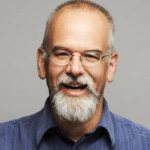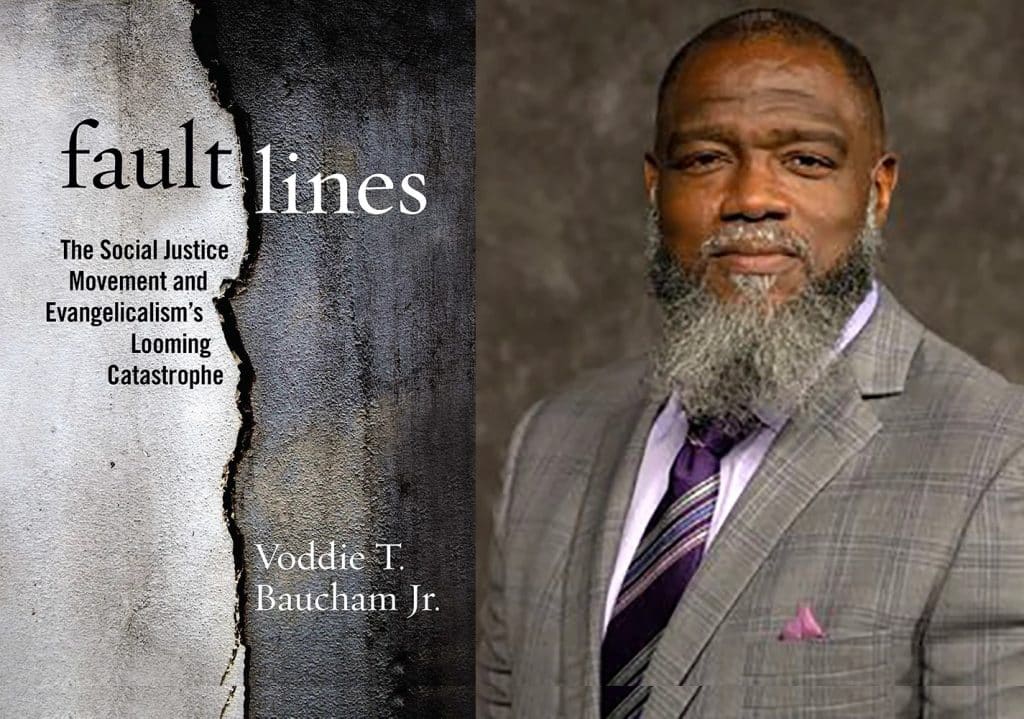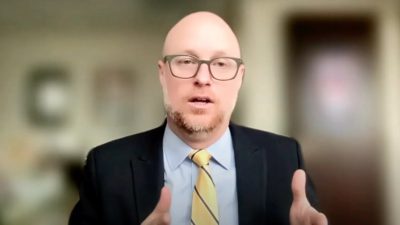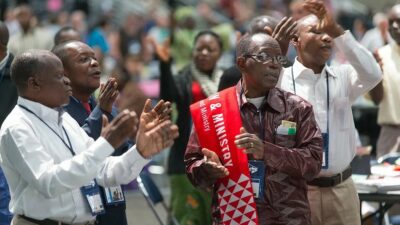The publisher of “Fault Lines,” a bestselling Christian critique of critical race theory, denies claims the book’s author misquoted sources and fabricated quotes.
Salem Books publisher Tim Peterson called claims unfounded.
“Fault Lines” by Voddie Baucham was a top 10 bestseller among religion books in April, May and July, selling tends of thousands of copies and prompting praise and criticism in evangelical circles. The book warns of a “looming catastrophe” in evangelical churches in the aftermath of the death of George Floyd.
Floyd’s death and the protests that followed revealed that secular ideas like social justice and critical race theory have infiltrated Christian churches, argues Baucham, a conservative author and seminary dean.
Those theories, he claims, run counter to Christian teachings.
Your tax-deductible gift helps our journalists report the truth and hold Christian leaders and organizations accountable. Give a gift of $30 or more to The Roys Report this month, and you will receive a copy of “Hurt and Healed by the Church” by Ryan George. To donate, click here.
In his book, Baucham points to the work of law professor Richard Delgado — one of the founders of critical race theory, an academic field that studies how systematic racism affects society — to bolster his argument.
“Racism advances the interests of both white elites (materially) and working-class whites (psychically). Large segments of society have little incentive to eradicate it,” Baucham quoted Delgado as saying.
Then Baucham included in the quote this statement, which he put in italics: “This means whites are incapable of righteous actions on race and only undo racism when it benefits them.”
Author and blogger Joel McDurmon claims the statement about “righteous actions” never appears in Delgado’s writings. In a blog post and on social media, he has accused Baucham of fabricating that statement and falsely attributing it to Delgado. He also alleges Baucham plagiarized the work of atheist author and anti-CRT activist James Lindsay.
VODDIE USES FALSE QUOTES and PLAGIARIZES
1) Not only has Voddie Baucham attributed false quotations, but he has both done so repeatedly and it appears he plagiarized some of the material he included.
This is not acceptable. https://t.co/dTVvQ4lmPJ
— Lambs Reign (@LambsReign) July 30, 2021
McDurmon, a conservative author who has spoken at events with Baucham in the past, said “Fault Lines” paints Delgado and other CRT scholars in the worst light possible. He argues that Baucham’s inclusion of and denouncement of the quote about whites being “incapable of righteous action” sets the tone for the entire book.
“There’s this very loose respect paid to what the sources actually say and mean,” he said. “And there’s this readiness to take them in the most sinister way possible.”
He also believes Baucham intentionally sought to mislead readers regarding McDurmon’s points at a January 2021 speech given by Baucham that includes the same contested Delgado quote. In the speech, the author appears to claim Delgado made the “incapable of righteous actions” statement in his writings.
“This means whites are incapable of righteous actions on race and only undo racism when it benefits them, when their interests converge with the interests of people of color—and yes, he used the word ‘righteous.’” Baucham said during the speech. “White people are incapable of righteous actions on race. Everything is racist … Again, not me — this is critical race theory.”
Baucham, a former pastor and dean of the school of divinity at African Christian University in Zambia, did not respond to a request for comment.
His critique of CRT has been controversial in part because Baucham is Black. That’s led to claims that his views are invalid, Baucham argued in a recent op-ed.
“As a Christian minister, I’m used to being stifled when I talk about my religion outside of church. If I bring up faith in Jesus Christ, the guardians of the secular public square are quick to inform me that my religion is strictly a private matter,” he wrote in the New York Post.
“But these days I’m stifled not because of the religion I practice but because of one I reject: the religion of antiracism, which is now the established church of academia, government, the media and business.”
His publisher said McDurmon’s accusations were more about style differences than plagiarism.
“The blogger’s claims of poor documentation and plagiarism in Fault Lines are not well-founded. McDurmon’s weak argument is based on his preference for quoting in an academic style of documentation and formatting, rather than the Chicago Manual of Style, which is the standard for popular-level works published not only by Salem Books but also for most of our peer publishers in the Evangelical Christian Publishers Association,” Peterson said in an email statement.
“It is common for academics to write both popular-level works and academic works and use different documentation styles accordingly. It is unreasonable for McDurmon to demand academic documentation in a popular work and it undermines his overall critique of Baucham’s assessment of Critical Race Theory.”
Controversies over CRT and plagiarism have roiled the evangelical world in recent months. A number of megachurch pastors, including former Southern Baptist Convention president J.D. Greear and Virginia megachurch pastor David Platt have been accused of being “woke” and promoting CRT. Critical race theory was also a topic of heated debate during the SBC’s annual meeting in June.
Meanwhile, Ed Litton, the current SBC president, has been accused of plagiarism, for using parts of sermons first preached by Greear without permission. Ironically, some of Litton’s fiercest critics have also enthusiastically promoted Baucham’s book.
Peterson left the door open for a future correction or clarification in “Fault Lines.”
“If we determine that there is a genuine need for correction or clarification we will do so in the next printing and issue an errata document accordingly,” he said in an email.
 Bob Smietana is a national reporter for Religion News Service.
Bob Smietana is a national reporter for Religion News Service.




















6 Responses
Just double checked this. The Chicago Style is very very close to the MLA and APA regarding block quotes. Is the publisher unaware of this? Wild.
I’m missing the “irony” in the two situations (Baucham and Litton). Baucham is being accused of something, and the jury is still very much out on whether he actually plagiarized anything or not. Litton is a serial plagiarizer whose thefts are available to anyone who wants to look. Let’s see how this plays out…
Apart from this, Baucham has written a book. This isn’t a sermon.
A pastor’s primary role in scripture is preaching the Word to the local congregation. If the local pastor is too busy or can’t be bothered with this, to the point where he farms the writing of the sermons out to a committee or preaches the work of others in full, that is a major, major issue. Particularly when that person leads a denomination while neglecting his most basic duty to his local body.
For the record, the person supposedly plagiarized has now responded on Twitter said that they find the allegations of plagiarism unconvincing.
Neil Shevni has also posted a helpful analysis, putting it down mostly to confused formatting in the book.
The convenient timing, at a time when practitioners of the social justice gospel are dealing with a plagiarism scandal around their handpicked choice for SBc president, is interesting.
But any attempt to “You, too” the plagiarism scandal surrounding Ed Litton, JD Greer and others falls flat when you consider not only the weakness of the particulars of these accusations against Baucham, but when you compare them with Litton lifting entire sermons, reproducing all the quotes, illustrations, and even the errors in full.
Well said Mark. It is interesting, or perhaps simply telling, that the author used the word “Ironically” to contrast Baucham and Greer at the end. It certainly shows his bias fairly blatantly considering the similarities between the two cases are incredibly small.
No matter how the publisher of Salem defend Voddie Baucham Faultline book it is full of quotes made by those who he claim was in fact what they quote but not in its entirety. It is both a misrepresentation, distortion, and crediting of the authors quote. Faultline is sloppy patchwork even at worst intellectual laziness.